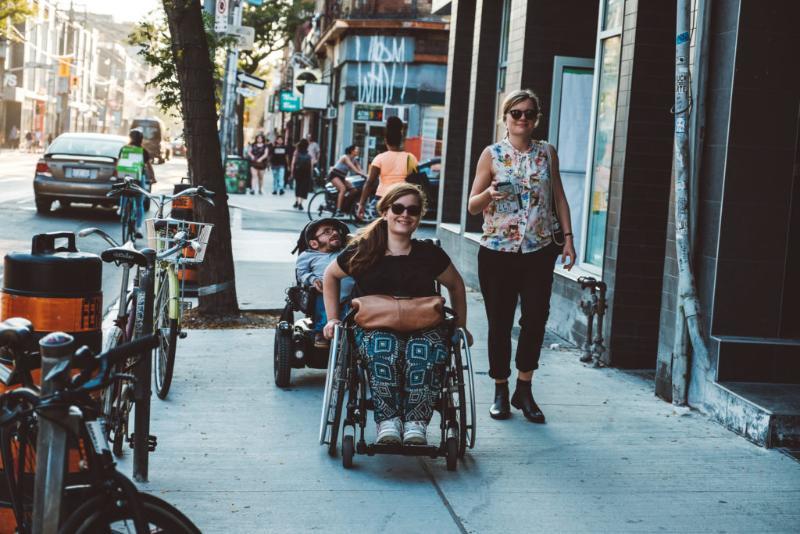A free wheelchair map app identifies stores, restaurants and streets that offer access to people with mobility problems
When you’re using a wheelchair to get around, steps at the entrance to a restaurant can force a change in plans.
“I’m just dependent on information,” says Judyta Smykowski, who is a wheelchair user in Berlin. “Is it accessible? Can I go there with my friend? Or am I going to be the showstopper for the evening?”
This is where an app called Wheelmap comes in. It’s a crowd-sourcing map app that allows users to share information about accessibility —at restaurants, stores, subway stops, and streets — or anywhere else. Places are colour-coded like traffic lights for wheelchair users: green for accessible, yellow for partially accessible, red for inaccessible, with extra designations for things like toilets.
“This really helps reduce the time we have to spend gathering information,” says Judyta, who is a community manager for Wheelmap. “The ideal solution would be stricter laws to make places accessible, but it’s not like that right now so we have to help ourselves.”
The app is free, and it was created around 10 years ago in Berlin by Holger Dieterich and a friend, Raul Krauthausen, who is a wheelchair user. They were both students at the University of the Arts in Berlin. Raul’s major was communication science, and Holger’s was e-business.
“We liked to get together to spin ideas, and we always went to the same coffee shop, and I asked him, ‘Hey, why don’t you come to my neighbourhood and let’s have a coffee there?’ And he said, ‘I don’t know which places I can go, I don’t know what is accessible.’”
So the next idea they developed turned into Wheelmap.
Equal participation in society
“Over one million places have been marked,” Holger says, “and Wheelmap is available in 30 languages in countries all around the world.” Users can add photos and commentary to make the information even more relevant.
Wheelmap shares data with similar mapping apps in other countries, such as Jaccede in France, which adds to its data and furthers its mission to make this information available to everyone.
“It’s not just about steps at the entrance of a restaurant,” Holger says. “It’s actually about equal participation in society, which is a human right. And this is a good tool because it gives people more freedom, but it also gives them a voice and power to demand more inclusion.”
People with some form of disability form a very large group of potential users. According to the World Health Organisation, more than one billion people in the world had a disability in 2021.
Wheelmap was a finalist in the 2021 Social Innovation Tournament. The contest was created by the EIB Institute to support entrepreneurs who are helping the environment and society.
Wheelmap is one of many projects of the non-profit organisation Sozialheld*innen (Social Heroes), which has several other projects, mainly focused on empowering people with disabilities and changing attitudes about disabled people.

Wheelmap is a project of Sozialheld*innen
As part of its efforts to change attitudes and to create income, Wheelmap has started organising community and corporate mapping events, where groups of people get together and explore their neighbourhoods, adding information to the Wheelmap app. During the lockdown periods of the pandemic, the events have been online. Wheelmap charges a fee for organising the events. The response has been enthusiastic, especially because businesses that want to demonstrate social responsibility have something measurable to show from the effort.
More than a mobility change for the disabled
In 2019, 25 Booking.com employees in Amsterdam added nearly 600 new ratings to Wheelmap.org. They increased the proportion of locations in Amsterdam that were evaluated from 56% to 68% — in just one afternoon.
“We get feedback from people who say, ‘I will never walk down the commercial street of my town again and look at it the same way. I can’t unsee this now, and this will change my behaviour.’ And as activists, this is what we want,” Holger says.
In the big picture, Wheelmap’s efforts benefit everyone, Judyta says. She points out that most people aren’t born with a mobility issue; they acquired it at some point in their lives through an accident, an illness, an age-related health problem, or they may have a mobility problem because they have a baby in a stroller. Suddenly, accessibility becomes an important factor in daily life.
“Fighting for disabled rights is not charity work,” Judyta says. “In Germany, 10% of people have a disability. And we’re paying customers and part of society. This is something that has not sunk in yet in society — which we see by the laws that are not there. But it’s something everyone should be aware of.”
